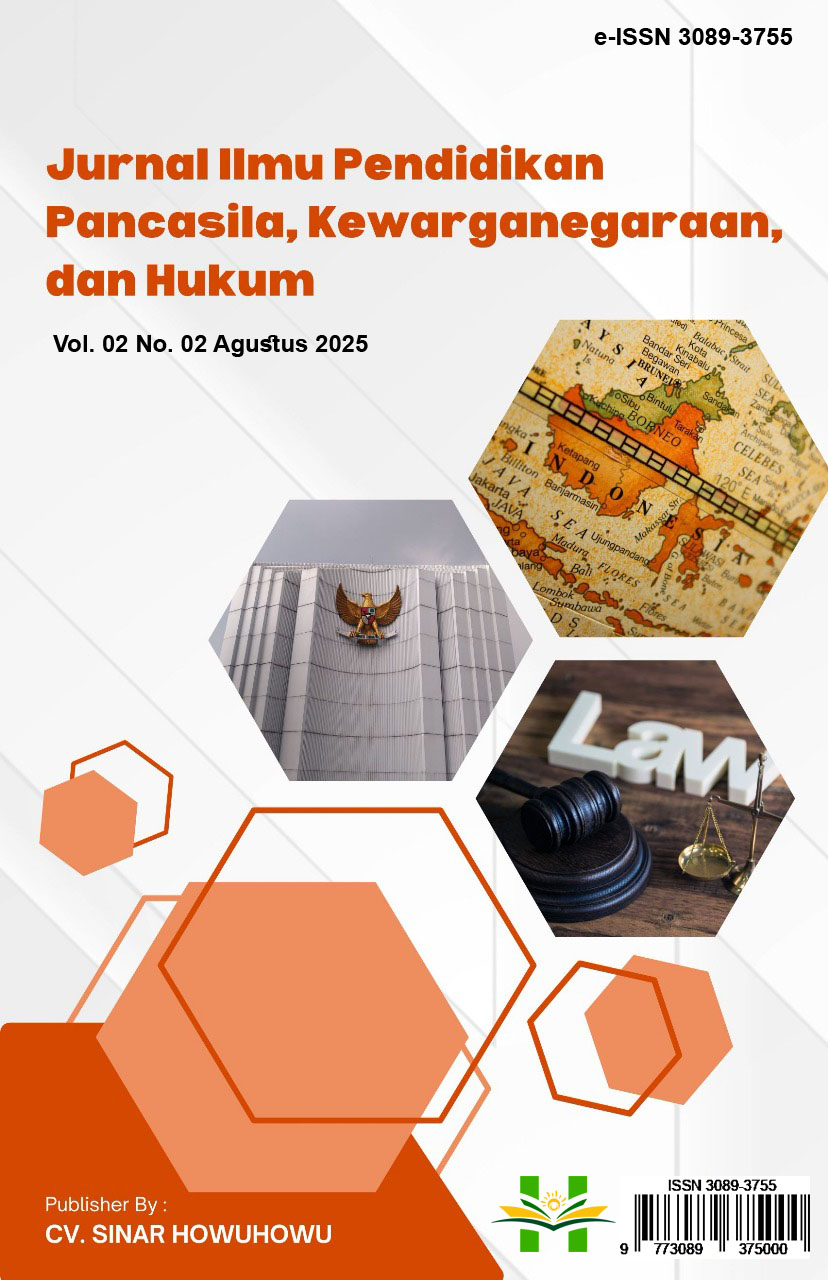Status Kewarganegaraan Ganda Dan Nasib Eksil 1965: Antara Penolakan Negara Dan Pengakuan Hak Sipil
DOI:
https://doi.org/10.70134/pakehum.v2i2.557Keywords:
G30S PKI, Political, CitizenshipAbstract
The downfall of Soekarno’s regime and the G30S PKI tragedy in 1965 led to the citizenship cancellation of Indonesian students and delegates who were previously studied abroad. Those accused of having affiliations with communism or loyalty to Soekarno had no chance to return to Indonesia and legal rights as Indonesians. This study aims to examine the political impact on the citizenship status of 1965 exiles and the challenges they faced in gaining recognition of their citizenship rights in the countries where they sought refuge. The methodology used is qualitative analysis, focusing on three countries with the highest number of exiles. Our paper indicates that most of Indonesian exiles have been revoked unilaterally by the Indonesian government, forcing them to seek alternative citizenship in the host countries. In the Netherlands, most exiles were induced to adopt Dutch citizenship due to the country’s single citizenship law, while in Russia and Czechoslovakia, where dual citizenship policies were more flexible, they found it easier to retain their Indonesian citizenship, although sometimes they faced legal limitations. In conclusion, despite experiencing injustice regarding their citizenship, these exiles continued to maintain their nationalism and hoped for recognition of their citizenship status. After the 1998 reform, the Indonesian government began to pay attention to the exiles by offering visa facilitation and reopening opportunities from them to regain their Indonesian citizenship.
Downloads
References
Adams, C. (1970). Indonesia's foreign policy and the dilemma of non-alignment. Cornell University Press.
Amnesty International. (1977). Indonesia: An Amnesty International report. Amnesty International Publications.
Anderson, B. R. O’G. (1983). Imagined communities: Reflections on the origin and spread of nationalism. Verso.
Aspinall, E. (2005). Opposing Suharto: Compromise, resistance, and regime change in Indonesia. Stanford University Press.
Bertrand, J. (2010). Political change in Southeast Asia: Dynamics of power and resistance. Cambridge University Press.
Bourchier, D., & Hadiz, V. R. (2003). Indonesian politics and society: A reader. RoutledgeCurzon.
Coppel, C. A. (2006). Indonesian Chinese in crisis. Equinox Publishing.
Cribb, R. (1990). The Indonesian killings 1965–1966: Studies from Java and Bali. Monash University Press.
Cribb, R. (2002). Political genocide in postcolonial Indonesia. In Totten, S., & Parsons, W. (Eds.), Century of Genocide (pp. 205–232). Routledge.
Davidson, J. S. (2009). The politics of violence: Indonesia’s civil-military relations. Routledge.
Elson, R. E. (2001). Suharto: A political biography. Cambridge University Press.
Faisal, M., Ramadhan, T., & Nuraini, R. (2017). Eksil 1965 dan problem status kewarganegaraan. Jurnal HAM, 8(2), 115–128.
Gusnelly, D. (2017). Eksil Indonesia: Perjuangan identitas dan negara. Jurnal Ilmu Sosial dan Politik, 20(3), 237–250.
Heryanto, A. (2006). State terrorism and political identity in Indonesia: Fatally belonging. Routledge.
Hill, D. T. (2010). Indonesia and the Internet: Freedom of expression and the state. Routledge.
International Commission of Jurists. (1971). Indonesia and the rule of law: Twenty years of ‘New Order’ government. ICJ Report.
Kleden, I. (2005). Menjadi Indonesia: Rekonstruksi identitas kebangsaan. Gramedia Pustaka Utama.
Lev, D. S. (1990). Legal evolution and political authority in Indonesia: Selected essays. KPG.
Lindsey, T., & Nicholson, P. (2009). Drugs law and practice in Southeast Asia. Cambridge University Press.
Mortimer, R. (1974). Indonesian communism under Sukarno: Ideology and politics, 1959–1965. Cornell University Press.
Ong, A. (1999). Flexible citizenship: The cultural logics of transnationality. Duke University Press.
Roosa, J. (2006). Pretext for mass murder: The September 30th Movement and Suharto’s coup d’état in Indonesia. University of Wisconsin Press.
Russian Federation. (1993). The Constitution of the Russian Federation. Moscow: Government of Russia.
Schwarz, A. (1994). A nation in waiting: Indonesia's search for stability. Allen & Unwin.
Simons, G. (2001). Indonesia: The long road to recovery. St. Martin’s Press.
Sumawiharja, L. (2024). Pemerintah akui eksil 1965 sebagai korban HAM: Sebuah langkah awal rekonsiliasi. Tempo.co. Diakses dari https://www.tempo.co
Suryadinata, L. (1997). Ethnic Chinese in Southeast Asia: Overseas Chinese policies of the PRC and the ethnic Chinese in Southeast Asia. Institute of Southeast Asian Studies.
Suryakusuma, J. (2011). Sex, power, and nation: An anthology of writings 1979–2003. Komunitas Bambu.
Tempo. (2023, Maret 15). Pemerintah bentuk tim pemantau pelanggaran HAM berat. Tempo.co. Diakses dari https://www.tempo.co
UN Women. (2020). Handbook on Legislation for Addressing Violence against Women. New York: United Nations Entity for Gender Equality.
Undang-Undang No. 12 Tahun 2006 tentang Kewarganegaraan Republik Indonesia.
Undang-Undang No. 186/2013 tentang Kewarganegaraan Republik Ceko.
UNHCR. (1951). Convention relating to the status of refugees. United Nations.
UNHCR. (1967). Protocol relating to the status of refugees. United Nations.
Van Klinken, G., & Barker, J. (2009). State of authority: The state in society in Indonesia. Cornell Southeast Asia Program.
Wijaya, A. (2019). Diaspora dan relasi warga-negara: Studi kasus eksil Indonesia di Belanda. Jurnal Masyarakat dan Budaya, 21(1), 45–63.
Yudhoyono, S. B. (2008). Indonesia’s foreign policy in the 21st century: Challenges and opportunities. Presidential Speech Archive.
Zurbuchen, M. S. (2002). History, memory, and the ‘1965 incident’ in Indonesia. Asian Survey, 42(4), 564–581.Suryani, T. (2021). “Penerapan Prinsip Non-Diskriminasi dalam Penanganan Kasus Kekerasan Seksual.” Jurnal Konstitusi, 18(1), 98–114.
Downloads
Published
Issue
Section
License
Copyright (c) 2025 Fadila Alimah Asrarudin, Mavinda Putri, Sekar Rini Wulandari, Shafa Qolbu Dwi Putri (Author)

This work is licensed under a Creative Commons Attribution-ShareAlike 4.0 International License.













